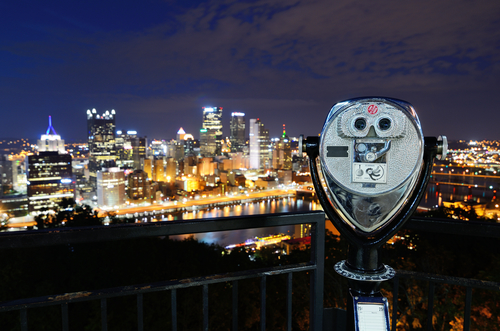
Pittsburgh – The Steel City
Have you read the headlines? PITTSBURGH —ranks #2 on ‘most unhappy’ cities list; ‘”A new study by the U.S. National Bureau of Economic Research ranks Pittsburgh as the second most unhappy city in the U.S. The city earned its ranking based on a survey asking respondents about their satisfaction with life”. (Joshua Gottlieb, of the University of British Columbia, Excerpts quoted in WPXI NEWS)
Loss of manufacturing, slow rising economic growth, diminishing population (Not to mention political backs and forths) has to demand of Pittsburghers’ a sacrifice of time, treasure, relentless work and mental stress to get back on the road to recovery.
Actually, recovery has begun already.
“While growth in the Pittsburgh economy has been slow and has failed to match the national averages, this should not be construed as a sign that the local area is still struggling — with only very limited success — to recover from the loss of steel and other manufacturing jobs over the past 20 to 30 years. Pittsburgh has completed the painful, but necessary, transition from a predominantly manufacturing economy, namely steel, to one which is more diversified and increasingly oriented toward the fast growing service-producing industries”. (Private Sector: Pittsburgh’s economy / Myths vs. realities, Pittsburgh Post-Gazette); nevertheless, Pittsburgh can use all the help that it can get; tax revenues, State support, philanthropy, investment in jobs and neighborhood cooperation. Everyone has to pitch in to make Pittsburgh the “Survivor on Three Rivers”
We mental health professionals can appreciate more than most, the strain on emotions that are felt by those who wake up and sleep each 24 hours in such a stressful environment. We understand how crucial Church, family, friends, neighborhood, community can be, especially at times like this.
But Pittsburghers, you are not alone. Nearly 20 percent of Americans — 44.5 million adults — experienced some sort of mental illness over the last year, according to a new report from the U.S. Substance Abuse and Mental Health Agency (SAMHSA). “Mental illnesses are treatable and people can recover to live full, productive lives. Unfortunately in the past year only 37.9 percent of adults with mental health problems received any type of care,” (Huffington Post)
This is where Counseling on Demand comes in. You need not go through this alone. With our support, you can get through these times.
We can help. You needn’t leave your favorite/private place. Nor must you wait for an appointment. We are there 24/7. You can begin in 24 hours or less.
You may contact us now. Your first consultation is free.
We await your call, email or text directly. If you want a face-to-face, we can Skype you on your computer, cell phone or tablet. Check out our chat line.